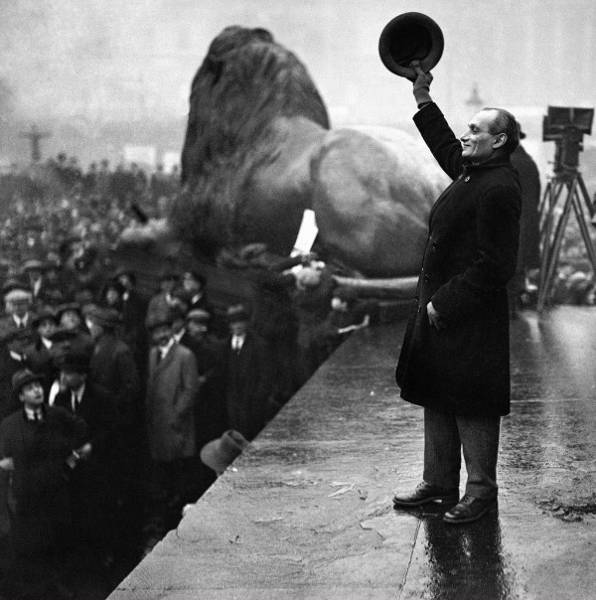Reporting on George W Bush's plea for another $87 billion to finance his war on Iraq, the New York Times noted grimly that the people who would be paying that back were unable to watch the broadcast: "They had already been put to bed by their parents." A few months ago, the Financial Times, not known as a paper given to leftwing polemics, went so far as to say that the Bush administration's fiscal policy is a case of the lunatics having taken over the asylum.
Is this overstating the case? Well, when George W Bush took office (or, to be more accurate, when the Supreme Court took office for him), the United States had a budget surplus of $230 billion. Oh, wicked Bill Clinton! On the strength of that the Congressional Budget Office projected a $5.6 trillion budget surplus for the period 20022011. Now, less than three years later, the Bush Administration has transformed that projected surplus into a $100 billion deficit, with most estimates predicting it will reach $400 billion before the end of the year, and the same Congressional Budget Office projecting a $2-3 trillion deficit by 2011. To be sure, a significant amount of this extra spending was forced on the Bush administration in the wake of September 11. And the US economy was already in trouble when Bush took office. But where the lunacy seems to come in is the idea that responsible political management consists of imposing the largest tax cuts in history at a time of spiralling deficit, increased government spending, and urgent infrastructural failures.
Some of Bush's more excitable spokespeople predict the tax cuts will match the budget surplus of $5.6 trillion predicted in the Clinton era. But as Paul MacAvoy, former MIT business specialist and political conservative, said, "Bush's numbers are rigid and unrealistic, relying on studies that don't yet exist." MacAvoy's concerns are shared by the education, health, transport, environment, and homeland security sectors. Even the mainstream churches and some Republicans have doubted the wisdom of the cuts.
But most objections have been brushed aside. The official line is that the tax cuts will reconnect Americans with what made them great in the past and will generate a renewed confidence in the economy. President Bush's official website declares:
"This tax relief plan promotes the values that make the American economy second to none access to the middle class, family, equal opportunity, and the entrepreneurial spirit. This plan will reduce taxes for everyone who pays income taxes, and it will encourage enterprise by lowering marginal tax rates."
Other groups are less sanguine. Citizens for Tax Justice, an independent research institute, has concluded that the poorest 60 per cent of households won't see any more than 12.7 per cent of the tax cut, which reverses the situation of the wealthy elite, the top 10 per cent, who stand to reap fully 60.3 per cent. Paul Krugman, an economist at Princeton has shown that the rich haven't had tax rates this low since the Hoover administration.
But while the rich rake it in, the poor continue to lose their jobs. Over three million jobs, many of them in the manufacturing sector, have been lost since the Bush Administration took office. In July 2003, official US unemployment figures reached 3.82 million, the highest figure since February 1983. But the real figure could be as high as 9.4 million, as people slowly lose hope of finding work and drop out of the statistics altogether. These figures are not solely the fault of the Bush administration. But what does defy common sense is their reaction to these serious problems.
The question has to be: why are they doing this? The key to the answer is to remember that this Bush administration is the most ideologically inflexible in American history. What, then, are the main points of the Bush ideology? Perhaps the overriding principle is the dislike of Big Government in all areas except the military. It is politically risky to say openly that your administration is against safety nets for the poor, elderly and disadvantaged. It is easier, though less honest, to create conditions whereby these provisions cannot be afforded, so that future administrations have to make the difficult decisions of cutting them.
For the Bush administration, any non defencerelated government spending is, by definition, misdirected or wasted. The common line among Republicans is that government spending becomes the tool by which liberals and humanists betray the robust ideals of selfreliance and godliness upon which the country was founded in favour of a nonpatriotic, amoral society given over to vice and national decline.
The old order of patrician, secular Republicans has all but disappeared, replaced in the main by a new cadre of god-fearing neoconservative imperialists. This has brought together a heady mix of apocalypticism and xenophobia. When President Bush declares that liberty is God's gift to the world, he means it. And he also means the unsaid subtext, that America is God's gift to the world by virtue of being the guardian of freedom's sacred flame. Big Government isn't just bad politics in Bush's eyes, it is bad theology.
Certainly, Cheney, Rove, Rumsfeld and the rest are more motivated by the traditional enticements of secular power. But they are fully aware of the powerful hold religious conservatives have on the Republican party, and the cost of alienating this bloc, as George Bush senior is said to have done. But there is no doubt that Bush, the figurehead for the administration, genuinely believes he is doing God's work.
Humanists are in a unique position to understand the Bush presidency, because humanists take religion seriously. Most commentators either dismiss the Bush administration's Godtalk as peripheral or a smokescreen for the 'real' (ie political) motivations. Humanists around the Western world are familiar with the reluctance to engage in any serious criticism of religion. In the United States this is much more serious because the huge evangelical sector is ready to shriek down anyone who raises the issue. This silence is a mistake, because it involves shutting off the ability to understand what the Bush administration is about.
An example of this is Tom DeLay, Republican leader of the House of Representatives, who is determined to impose what he calls a 'biblical worldview' on the American people. A biblical worldview seems to consist in an idealised version of 1950s America; unchallenged power, culturally homogenous, patriarchal, evangelical and segregated. The brilliant film Pleasantville captured the mood of what a biblical worldview would be like. Because of the selfimposed blackout on any criticism of religion, DeLay's fanaticism goes unnoticed in all but a few marginal journals.
Even in areas open to debate, there is a perplexing level of support for the Bush administration. In most circumstances, the obituary could be written for an administration which had presided over the loss of three million jobs, converted a respectable surplus into a gargantuan deficit, and alienated itself from most of its allies. But not in America, where there is still significant support for tax cuts among the general population; the people set to benefit from them the least. Much of the commentariat is opposed to the cuts, but the public at large has largely ignored their counsel. Many Americans see no difficulty in supporting hugely expensive military forces, while also feeling they deserve greater medical, educational and infrastructure benefits and a generous tax cut in their pocket. Even harder to reconcile is that most people are aware that the cuts favour the rich disproportionately, but this doesn't dampen their enthusiasm. No matter how unlikely, people cling to the American dream that they too might one day be counted among the super rich. George W Bush is riding on the crest of this wave of political myopia. Despite his having enjoyed every possible advantage money and social position can buy, many Americans believe George W Bush represents ordinary Americans.
This might be about to change. For a while Bush looked unassailable in 2004, and the Democratic nominees for president were struggling to make names for themselves. But we must always remember that few people had heard of Jimmy Carter a year before his election victory in 1976, or Bill Clinton a year before his victory in 1992. One of the Democrat contenders may well emerge from the gloom and achieve the level of recognition needed in order to attract the sort of funding to get within the range of Bush's dauntingly large war chest. What makes things difficult for the Democrats is that the candidate who is achieving the greatest press attention at this early stage is Howard Dean, who conventional wisdom sees as the candidate least likely to attract middle America away from Bush. Dean's achievement has been to drag the other Democrat contenders to take up positions more openly critical of Bush than they were prepared to do earlier on. This may well work to the advantage of John Kerry, the wealthiest of the contenders, and the preferred choice of the Democratic party hierarchy. Waiting in the wings is the underrated John Edwards from North Carolina. The late arrival of General Wesley Clark has also helped bulk up the credibility of the Democrats. A Kerry/Clark or Edwards/Clark ticket would constitute a credible and serious challenge to a second Bush term.
So, things could still turn to custard for George W Bush, as they did for his father. The ongoing human and financial attrition in Iraq and a worsening slump at home may conspire against his re-election, but at the moment he must still be thought to have a commanding advantage. The victory of Arnold Schwarzenegger in the recall election in California has sent mixed messages. The Republicans can take heart from winning a crucial state, but the Democrats can console themselves that Schwarzenegger's social politics are closer to theirs than to the identikit Republican. Another Californian, the economist Robert Freeman, advises Americans to "wake up from our patriotismbesotted, warinduced stupor." He is right, but few seem to be listening. Certainly not the sleeping children who will be paying for Bush's hubris in a few year's time.

